The Australia West Papua Association (AWPA) has written to Australian foreign minister Julie Bishop over the banning of rallies in West Papua that had been called for October 13.
The purpose of the rallies was to call on the Indonesian government to free the two French journalists Valentine Bourrat and Thomas Dandois who were arrested on the 6th of August in Wamena and remain detained in Jayapura. They could face up to five years in prison.
-
-
Thomas Dandois and Valentine Bourrat, two French journalists arrested by Indonesian authorities on August 6 while reporting on West Papua's independence movement, will face trial on October 20, AFP reported on October 14. Despite a petition signed by more than 8800 people, the journalists will go on trial in a local court of West Papua for “abusive use of entry visas”.
-
 Indonesian authorities are pushing for two French journalists arrested in West Papua to face trial and up to 20 years jail. Valentine Bourrat and Thomas Dandois, journalists working for French media company Arte TV, were in West Papua filming a documentary about human rights. They were arrested in Wamena on August 6. Indigenous leader Areki Wanimbo, who was interviewed by them, was also arrested.
Indonesian authorities are pushing for two French journalists arrested in West Papua to face trial and up to 20 years jail. Valentine Bourrat and Thomas Dandois, journalists working for French media company Arte TV, were in West Papua filming a documentary about human rights. They were arrested in Wamena on August 6. Indigenous leader Areki Wanimbo, who was interviewed by them, was also arrested. -
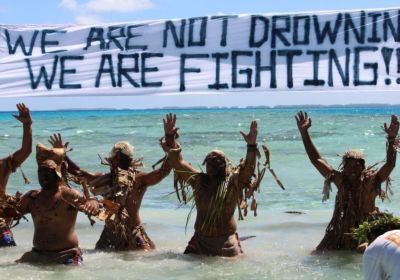 “The rising sea levels caused by global warming threaten the very existence of some of our neighbours,” Fijian Prime Minister Frank Bainimarama told the Pacific Island Development Forum (PIDF). “Kiribati, Tuvalu and the Marshall Islands ― and are already swamping the coastal areas of many Pacific nations, including Fiji.”
“The rising sea levels caused by global warming threaten the very existence of some of our neighbours,” Fijian Prime Minister Frank Bainimarama told the Pacific Island Development Forum (PIDF). “Kiribati, Tuvalu and the Marshall Islands ― and are already swamping the coastal areas of many Pacific nations, including Fiji.” -
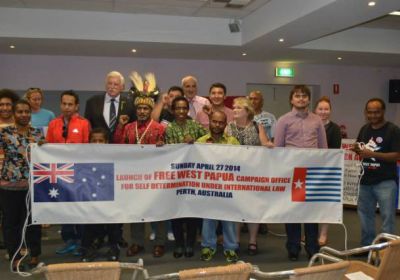 The first Free West Papua campaign office in Australia was opened in April in Perth, signalling the growing international campaign for West Papuan self-determination. West Papua has been occupied by Indonesia since the 1960s, despite an ongoing struggle for independence. Benny Wenda, a leader of Free West Papua living in exile, said he hoped the Australian government would withstand pressure from Indonesia over the office opening.
The first Free West Papua campaign office in Australia was opened in April in Perth, signalling the growing international campaign for West Papuan self-determination. West Papua has been occupied by Indonesia since the 1960s, despite an ongoing struggle for independence. Benny Wenda, a leader of Free West Papua living in exile, said he hoped the Australian government would withstand pressure from Indonesia over the office opening. -

Many see Australia as a small power dependent on British and then US power for protection, but it is important to note that Australia has its own imperialist agenda it pushes the Pacific region.
-
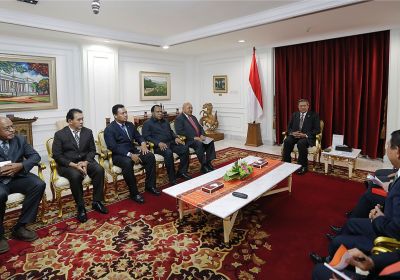 The West Papuan independence movement's hopes of of gaining a foothold in the international community were set back when foreign minsters visiting West Papua pledged non-interference with Indonesia. Last June, the Melanesian Spearhead Group (MSG) Leaders Summit met in Noumea, New Caledonia, and discussed a membership application from the West Papua National Council for Liberation (WPNCL). The summit postponed the decision until a ministerial delegation visited West Papua to determine the legitimacy of the group and to assess the situation in the occupied country.
The West Papuan independence movement's hopes of of gaining a foothold in the international community were set back when foreign minsters visiting West Papua pledged non-interference with Indonesia. Last June, the Melanesian Spearhead Group (MSG) Leaders Summit met in Noumea, New Caledonia, and discussed a membership application from the West Papua National Council for Liberation (WPNCL). The summit postponed the decision until a ministerial delegation visited West Papua to determine the legitimacy of the group and to assess the situation in the occupied country. -
 Hundreds of people have been arrested and some killed as Indonesian authorities crack down on events commemorating the declaration of West Papua's independence. On December 1, West Papuans mark the first raising of the Morning Star flag, a symbol of West Papuan independence. On that day in 1961, the flag was raised by the New Guinea Council, the parliament in the then-Dutch colony. Soon after the ceremony, Indonesia invaded West Papua, claiming it was part of its campaign to liberate the Dutch colonies of the East Indies.
Hundreds of people have been arrested and some killed as Indonesian authorities crack down on events commemorating the declaration of West Papua's independence. On December 1, West Papuans mark the first raising of the Morning Star flag, a symbol of West Papuan independence. On that day in 1961, the flag was raised by the New Guinea Council, the parliament in the then-Dutch colony. Soon after the ceremony, Indonesia invaded West Papua, claiming it was part of its campaign to liberate the Dutch colonies of the East Indies. -
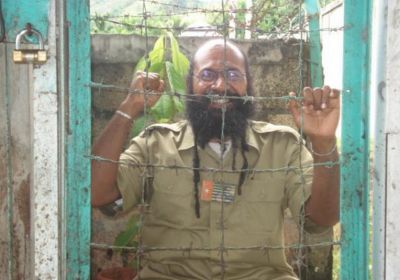 Filep Karma is a 54-year-old West Papuan independence activist and long-term political prisoner. He is in jail for his non-violent political activities in the struggle for West Papuan self-determination. In 2004, Karma organised a Morning Star flag-raising ceremony to celebrate the anniversary of the Papuan declaration of independence from Dutch rule in 1961.
Filep Karma is a 54-year-old West Papuan independence activist and long-term political prisoner. He is in jail for his non-violent political activities in the struggle for West Papuan self-determination. In 2004, Karma organised a Morning Star flag-raising ceremony to celebrate the anniversary of the Papuan declaration of independence from Dutch rule in 1961. -
 A recent report details genocide against the indigenous people of West Papua carried out by the Indonesian government, which has occupied the territory since the 1960s. The report, “A slow-motion genocide: Indonesian rule in West Papua”, was written by Dr Jim Elmslie and Dr Camellia Webb-Gannon, both visiting scholars at the Centre for Peace and Conflict Studies at Sydney University. It was published in the Griffith Journal of Law and Human Dignity.
A recent report details genocide against the indigenous people of West Papua carried out by the Indonesian government, which has occupied the territory since the 1960s. The report, “A slow-motion genocide: Indonesian rule in West Papua”, was written by Dr Jim Elmslie and Dr Camellia Webb-Gannon, both visiting scholars at the Centre for Peace and Conflict Studies at Sydney University. It was published in the Griffith Journal of Law and Human Dignity. -
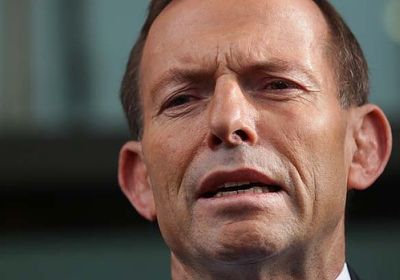 I recently had the misfortune of being granted an audience with Prime Minister Tony Abbott, and was unlucky enough to conduct an interview with him. I include the transcript below. * * * Well, thank you very much, prime minister, for agreeing to this interview. Well, I am always very happy to be interviewed by my good friends at the Daily Telegraph. Yes... You’ve moved offices I see. Nice Che Guevara poster! Yes... Can I get you something to drink? I’m having a beer. You don’t have any Bollinger do you?
I recently had the misfortune of being granted an audience with Prime Minister Tony Abbott, and was unlucky enough to conduct an interview with him. I include the transcript below. * * * Well, thank you very much, prime minister, for agreeing to this interview. Well, I am always very happy to be interviewed by my good friends at the Daily Telegraph. Yes... You’ve moved offices I see. Nice Che Guevara poster! Yes... Can I get you something to drink? I’m having a beer. You don’t have any Bollinger do you? -
 Protesters gathered outside the immigration department CBD offices on October 18 to call on the Australian government to allow seven West Papuan asylum seekers to seek protection in Australia. The seven West Papuans arrived in Australia’s Torres Strait on September 24. They fled West Papua, fearing reprisal for involvement with a Freedom Flotilla from Australia.
Protesters gathered outside the immigration department CBD offices on October 18 to call on the Australian government to allow seven West Papuan asylum seekers to seek protection in Australia. The seven West Papuans arrived in Australia’s Torres Strait on September 24. They fled West Papua, fearing reprisal for involvement with a Freedom Flotilla from Australia.